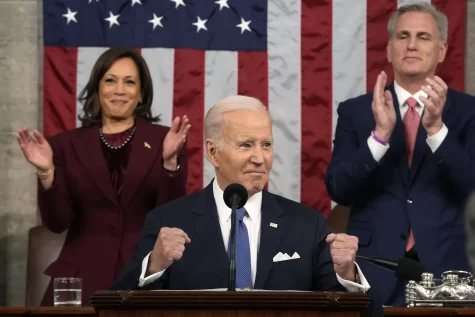Dean Sudol seeks help from faculty
While applauding the growth of the College of Arts and Sciences, its dean Ron Sudol said that he was “disturbed” by the low retention and graduation rate for Oakland University’s First Time In Any College students, and invited the faculty to help solve the problem.
Sudol said faculty has a role in turning around the fact that on average, only 74 percent of FTIAC students, a commonly-used statistical term, return to OU for a second year, and of these 74 percent, only 12 percent graduate in four years and only 41 percent graduate in six years. He said these figures, which were gathered by the Office of Institutional Research and Assessment at OU, are all below OU’s benchmarks and below OU’s peer institutions.
“I hear a lot of talk about faculty governance,” he said at the annual state of the college of arts and sciences address to the CAS assembly on Tuesday, Oct. 20, attended by about 50 faculty members. “This is an open invitation to seize the opportunity … making the university as good as it can be.”
One attendee asked whether student retention — especially of the students who use OU only as a stepping stone to a “better” university — is really the job of the teachers, or better suitable for departments of marketing, recruiting and enrollment management.
Sudol replied that there is only so much these departments can do, and that once students are here, especially those who use OU as a glorified community college, “who is better to keep them here than the faculty?”
He also said he was impressed that CAS enrollment grew by 8.5 percent this year, while enrollment at OU as a whole grew by 4.1 percent, especially because CAS accounts for 65 percent of OU’s curriculum. Although the school of health sciences grew by 22.5 percent, it has fewer actual students than CAS.
Sudol said he was “delighted” by the higher-than-expected number of students who declared their major as cinema studies (15), Japanese (31), social work (66) and writing and rhetoric (28), because these majors were created recently.
He said he was glad to announce that 95 percent of graduate students admitted to CAS programs at OU ended up enrolling in those programs.
Sudol quoted the Office of Institutional Reasearch and Assessment data and said that 52 percent of credit hours were taught by tenured and tenure-track faculty in fall 2008, an increase from previous years. About 45 percent were taught by part-time and teaching assistants, and visiting faculty taught the rest.
He said it’s “headed in the right direction,” although very slowly. He said the goal for credit hours taught by tenured and tenure-track faculty was 70 percent, and he doesn’t think it’s going to make any progress this year, because faculty is underfunded, but that the college should keep pushing in that direction, and expect progress in tiny increments.
One attendee asked what can be done to bring this number up.
“The way you do it at Oakland is through argument,” Sudol replied. “I came from the department of rhetoric, so arguing is what I do … The numbers are on our side.”
One argument Sudol said he makes to the OU administration for maintaining a good amount of tenured and tenure-track faculty is that OU revenue from the grants awarded to these faculty members increased by 30 percent this year.
Sudol also announced the status of new majors and initiatives being considered by the college.
A bachelor of liberal arts studies, a multidisciplinary degree, is being discussed, and may be available for students by fall 2010, as well as a master of arts in communication. A master of arts in psychology is also being discussed, and may take longer to be available.
Sudol said in an interview with The Oakland Post that there may be a major in Chinese in a couple years, and possibly a minor in Arabic later on. He said there is also talk of a doctorate program in applied computational physics.
A bachelor of arts in actuarial science became available this year.
Sudol said because of a federal higher education bill passed in 2008, OU faculty will be required to have textbook information ready when students register for classes starting next year. Some attendees said this may be problematic. Sudol said the details are being worked out.
He said CAS is trying to replace the “outdated” college distribution requirements, hopefully by fall 2010, with “exploratory” requirements that would focus on learning outcomes, instead of on different disciplines like now.
He said in an interview that the future focus of CAS should be on interdisciplinary studies and international studies because that’s what employees look for.
What changes are being made to graduation ceremonies starting winter 2010?











